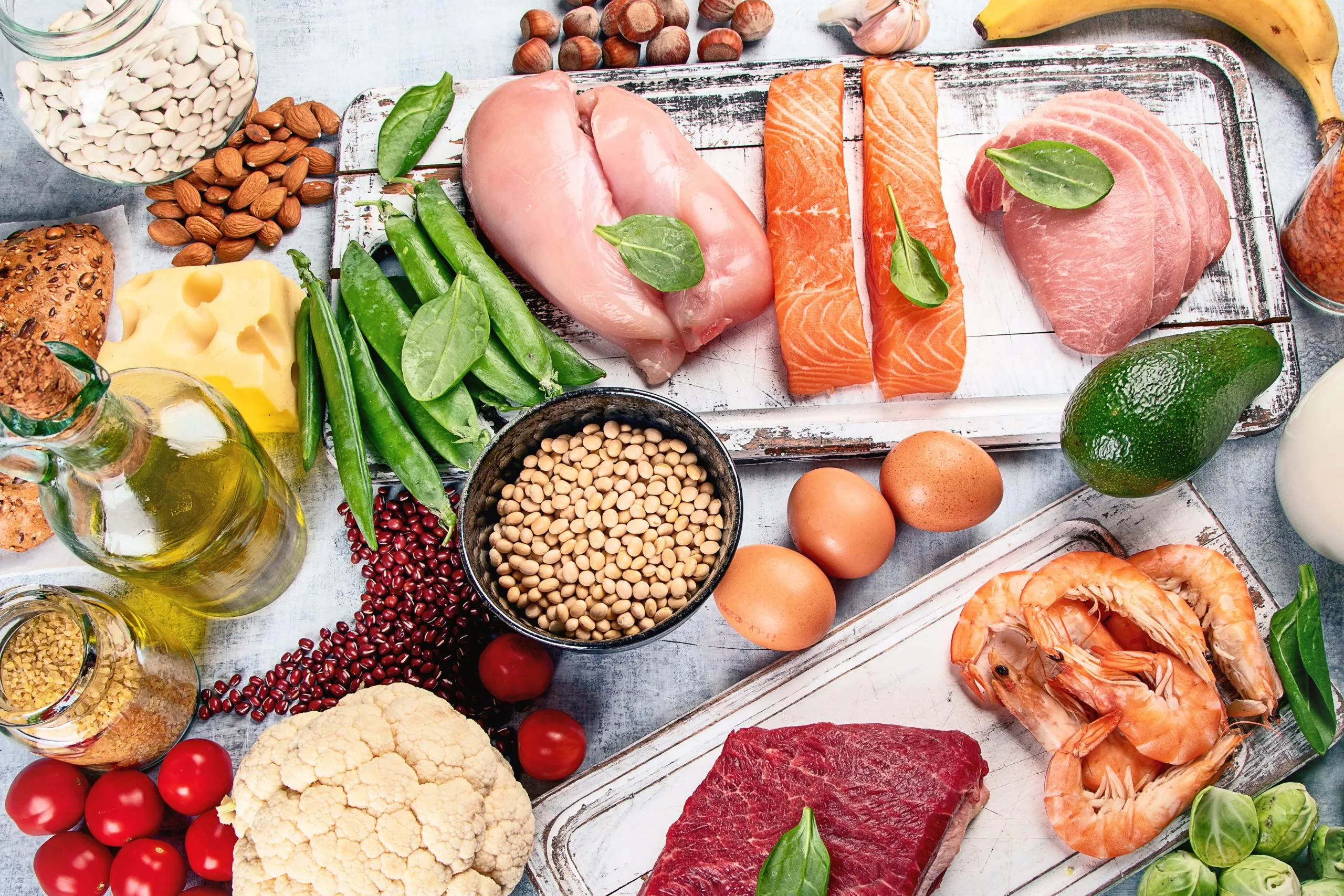
Key facts
- Protein is found in foods and is needed to help you grow.
- Protein also helps keep you healthy and helping fight illness.
- Humans, need 20 different amino acids.
- Proteins are found in animal and plant foods.
What are proteins?
Proteins are components of food that are essential for life. They are found in animal and plant foods like:
- meats
- fish
- dairy foods
- nuts
- grains, legumes and beans
Protein is also found in small amounts in breads, cereals, rice, pasta and vegetables.
Your body needs protein from food to work properly.
What is protein used for in my body?
Proteins do most of the work to keep your body functioning every day.
Protein is needed by the cells in your body to grow and repair.
Protein has different jobs in your body including:
- antibodies — proteins that fight infections from viruses and bacteria
- enzymes — to help you digest food and help your body’s metabolism
- messenger proteins — transmit signals throughout the body, such as hormones
- proteins that provide structure and support for cells like muscles
Eating a healthy diet that meet the Australian dietary guidelines will ensure your body gets enough protein each day.
How much protein do I need?
Most Australians get enough protein in their everyday diets. The amount of protein you need depends on your age, sex and stage of life.
It‘s important to make sure you eat enough protein when you are:
- unwell
- growing
- recovering from illness
This can be when you are:
- a child or teenager
- a recovering from surgery or have been sick.
- a woman who is pregnant or breastfeeding
- an older adult
- under-nourished
- a strict vegan or vegetarian
What foods are high in protein?
You can get protein from eating a range of foods. These can be:
- lean meats, poultry and fish
- eggs
- milk and dairy foods such as yoghurt, cheese, custard or enriched dairy milk alternatives
- nuts and seeds
- legumes and beans
It’s a good idea to eat a meal which includes protein 2 or 3 times a day. This can help you stay healthy.
Plant-based proteins
You can get protein from plant foods.
- Legumes — are high protein and contain other nutrients that can lower cholesterol, as well as fibre. Good choices include beans, chickpeas, lentils, split peas and soybeans.
- Tofu — is high in protein and is a good substitute for meat or poultry.
Animal-based proteins
Animal sources of protein include:
- Fish and seafood — 2-3 serves of fish or seafood a week is good for your heart. A serve is 150g.
- Eggs — contain lots of protein as well as vitamin A, E and B12, selenium choline, iron and cholesterol. Limit yourself to 7 eggs a week if you have: high cholesterol, type 2 diabetes or heart disease.
- Poultry — such as chicken, turkey and duck.
- Red meat — is an excellent source of protein, but it has been linked to heart disease and stroke. Limit red meat to 1 to 3 meals a week. Red meat includes beef, veal, pork, lamb and kangaroo.
- Dairy — protein is found in milk, cheese and yoghurt. These also contain calcium and protect against disease. Choosing mostly low-fat varieties is best for your health.
Protein rich foods to eat less of
Protein is also found in processed meats such as ham and salami. But these tend to be high in fat, high in salt and contain a lot of additives. It’s best to avoid or limit the amount of processed meat you eat.
Eating processed meat also increases your risk of bowel cancer and stomach cancer. Cutting down on red and processed meats will reduce your cancer risk. Processed meats are foods like:
- bacon
- ham
- devon
- frankfurts
- chorizo and cabanossi
- pies and sausage rolls
- kransky
High-protein diets
The best way to build muscle is by exercise and eating adequate energy to build muscles. Foods that contain carbohydrates help your muscles work better.
Protein is only valuable when you are doing intense exercise. It can help your recovery if you are doing resistance training or moderate to high intensity exercise for a long-period of time.
Most people in Australia already get enough protein in their diet. Your body can’t store protein. Too many protein rich foods will provide you with energy and may also contribute to weight gain.
Do I need to follow a high protein diet to lose weight?
If you are trying to lose weight, getting enough protein can helps you to feel full for longer.
If you decide to follow a high-protein diet, it’s a good idea to talk to your doctor or dietitian first.
Supplements
Some people who are trying to lose weight choose to eat extra protein. They may get extra protein by drinking protein shakes or taking supplements.



